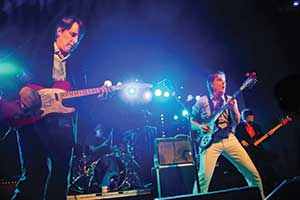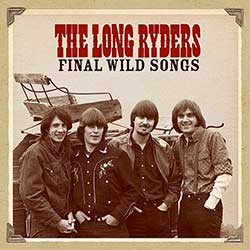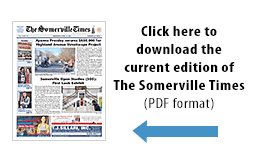
The Long Ryders are on the road once again and stopping off for a show at ONCE Ballroom on Friday, November 11.
Alternative country originals back by popular demand
*
By Blake Maddux
Despite recording only three full-length albums and one EP between 1983 and 1987, The Long Ryders ended up casting an admirably long shadow in terms of its musical influence.
“If you drew a straight line from The Byrds through Wilco,” Michelle Ochs said in her NPR review of the band’s 2016 four-disc box set Final Wild Songs, “you’d intersect the Long Ryders right in the middle.”
Ochs’s assessment is correctly indicative of the inspiration of The Long Ryders on what would come to be known as alt-country and Americana in the 1990s and 2000s.
The Long Ryders formed on Thanksgiving Day 1981 in Los Angeles and took its name from a 1980 movie whose title was spelled in the conventional manner. Stephen McCarthy says that his audition for the group was prompted by an ad that read, as he recalls, “Band looking for guitarist. Buffalo Springfield meets The Clash.”
Having already had some members depart and be replaced by others, the line-up of Kentucky-born Sid Griffin, Virginian Stephen McCarthy, Indiana native Tom Stevens, and lone Angeleno Greg Sowders recorded the 1984 album Native Sons.

The Long Ryders’ recently released box set “Final Wild Songs” offers a nearly complete discography of the band’s recorded work to date.
This album and its follow-ups met with praise from critics and fans (which included the members of R.E.M.), leading to performances in front of enthusiastic American audiences and even more enraptured European ones. However, Stevens and McCarthy left the band in 1987 despite the offer of an opening spot on tour with Island Records labelmates U2. The Long Ryders subsequently broke up.
Griffin, McCarthy, Stevens, and Sowders reunited for a brief tour of Europe in 2004, capturing the London show on the live album State of Our Reunion, but did not perform stateside again until 2009 and 2014.
The release of the 76-track Final Wild Songs on the UK label Cherry Red Records this past January was followed in the spring by 12 European dates. The Long Ryders’ first East Coast gigs in 29 years this fall include a night at ONCE Ballroom.
McCarthy spoke to The Somerville Times by phone from his home in Richmond, VA, the city in which he was born, raised, and to which he returned 25 years ago.
The Somerville Times: Which artists did you listen to in your youth that influenced the music that you ended up playing as an adult?
Stephen McCarthy: I am the youngest of four, and so my sister and my older brothers, they were all into distinctly different genres of music. My oldest brother was solely into Otis Redding and Wilson Pickett and James Brown. My sister was completely into British Invasion and saw The Beatles play in New York. And my other brother was into The Beach Boys and Jan & Dean. So I got this kind of cross-mix of all these different genres and they kind of filtered down to me. I started getting into country music after that, and that’s what I brought to the band, that country element, to mix in what they had grown up with.
I was always drawn not to the lead singers of these groups so much, but who was playing banjo in the band, and who was play lap steel or pedal steel or fiddle. I think that that got me interested in being more of a utility guy that played different instruments as opposed to being the front man.
TST: For a band that sounded so American and included members from Indiana, Kentucky, and Virginia, The Long Ryders seemed to be more popular in Europe than in the United States. Why do you think that was?
SM: That definitely was the case, and probably still is to this day. We were over in England and Spain this past spring and played to great audiences in both countries. It’s music that wasn’t born there, this American roots-country hybrid that they appreciated but it didn’t come from their shores, so people were attracted to it because of that. It wasn’t strictly country and it wasn’t a punk band. It was a combination of a few different things. When we first got over to England in 1984, the scene over there at the time was like more synthesizer pop music. I think [our sound] was kind of a fresh idea, a movement that they weren’t used to. They had a punk scene going on, but it wasn’t really one that really included a roots-country element. We got a lot of attention because it was so different from the scene that was going on there at the time.
TST: What was the prime motivation behind the release of the box set Final Wild Songs?
SM: The first thing that comes to mind is that some of the records were out of print. We were playing some shows and some people were asking where they could get this or that album. So Sid had talked to the people at Cherry Red, and they said yeah, let’s do this. It took a couple of years to finally make it happen, but it’s all there in one spot, you know? It’s most of the stuff that we’ve done. It’s not everything, but all the records and I think a live disc and there’s some outtakes. They really did a nice packaging of that. We’ve been able to use that to promote the European tour and this current tour that we’re on to kind of get people interested in the band again.
TST: Is there any possibility that the band will record new material?
SM: Well, were going to decide that when we meet up. We really kind of cherish these old records and we don’t won’t to put out something that would just be mediocre. We’re going to talk about it, and I think that I would like to do something and I think the others would also, because as much fun as it is to play these old tunes, they are 30 years old. So I think that if you’re going to play somewhere, it would be nice to have something fresh and new to play to people. I’m hoping that we can pull that off.
TST: Are there any Long Ryders songs that you think a pertinent to the current political climate?
SM: I guess the thing that comes to mind is the song Looking for Lewis and Clark, which I always considered our best song. It’s Sid’s song. People are always kind of searching for heroes. That can be kind of a dangerous game because people are fallible and it’s kind of difficult to put somebody up on a pedestal. People are trying to find someone to represent them with honesty and integrity and (laughs) it’s a difficult thing to achieve. I guess that’s what we’re finding out now. But hopefully everything will work out.
TST: Do you have any specific memories of times that the band played Boston?
SM: We had a lot of great times in Boston and playing with some groups that were popular up there at the time. Some pretty cool Boston groups like The Del Fuegos and the Lyres. We’re really looking forward to getting back up there. I think we met the J. Geils [Band] guys one time and we ended up at a party with them. Going to Fenway, just doing classic Boston things like that. That was a thrill to go to that old park. Went to some Celtics basketball games. We were at a club one night, and I believe the Celtics coach K.C. Jones, I believe that’s who it was at the time, he got up and sang a blues song at a night club. We were having a beer there and that was great to witness that.
The Long Ryders with Cactus Attack. Friday, November 11. Doors at 8 p.m., show at 9. Tickets $20-$25. ONCE Ballroom, 156 Highland Ave., Somerville.












Reader Comments